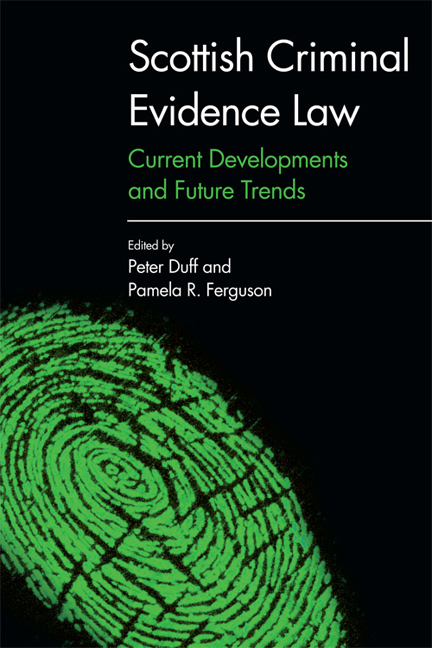Book contents
- Frontmatter
- Contents
- The Contributors
- Acknowledgements
- Table of Cases
- Table of Legislation
- Introduction
- 1 Cadder and Beyond: Suspects’ Rights and the Public Interest
- 2 ‘Access to Justice’ for Complainers? The Pitfalls of the Scottish Government’s Case to Abolish Corroboration
- 3 The Relevance of Sexual History and Vulnerability in the Prosecution of Sexual Offences
- 4 ‘Similar Fact’ Evidence and Moorov: Time For Rationalisation?
- 5 Hearsay in Scots law: Rethinking and Reforming
- 6 Eyewitness Identification Evidence and its Problems: Recommendations for Change
- 7 Assessing Witness Credibility and reliability: Engaging Experts and Disengaging Gage?
- 8 The process of Criminal Evidence Law Reform in Scotland: what Can We Learn?
- 9 Scottish Criminal Evidence Law Adrift?
- Bibliography
- Index
9 - Scottish Criminal Evidence Law Adrift?
Published online by Cambridge University Press: 24 April 2021
- Frontmatter
- Contents
- The Contributors
- Acknowledgements
- Table of Cases
- Table of Legislation
- Introduction
- 1 Cadder and Beyond: Suspects’ Rights and the Public Interest
- 2 ‘Access to Justice’ for Complainers? The Pitfalls of the Scottish Government’s Case to Abolish Corroboration
- 3 The Relevance of Sexual History and Vulnerability in the Prosecution of Sexual Offences
- 4 ‘Similar Fact’ Evidence and Moorov: Time For Rationalisation?
- 5 Hearsay in Scots law: Rethinking and Reforming
- 6 Eyewitness Identification Evidence and its Problems: Recommendations for Change
- 7 Assessing Witness Credibility and reliability: Engaging Experts and Disengaging Gage?
- 8 The process of Criminal Evidence Law Reform in Scotland: what Can We Learn?
- 9 Scottish Criminal Evidence Law Adrift?
- Bibliography
- Index
Summary
INTRODUCTION
In a controversial book, Evidence Law Adrift, Damaska, probably the most influential, contemporary theorist of comparative criminal procedure, claimed that the law of criminal evidence in Anglo-American common law systems had lost its moorings in its traditional adversarial ideology. To what extent is this true of Scottish criminal evidence law? This collection demonstrates that over the past twenty years or so, Scots law in this area has undergone unprecedented change and is, in the eyes of many practitioners and commentators, in a state of flux. The issue to be tackled in this chapter is whether any pattern to this change can be discerned and any future direction of development identified. On first sight, it might be argued that the process of change has simply been a chaotic result of new pressures, such as the rise of the victim movement, the incorporation of the European Convention on Human Rights (ECHR) into Scots law, the attempt to rationalise and modernise the law, and the need to husband scarce resources and increase efficiency, all combined with various knee-jerk political responses to high-profile cases and more general political pressures. This might lead to the conclusion that the law has indeed cast free of its adversarial anchorage and that there is little point in trying to predict the future. In my opinion, however, the latter view is rather too pessimistic and it might be possible to foresee, somewhat indistinctly, the future evolution, rather than total revolution, of Scottish criminal evidence law.
There exist various well-known analytical tools for identifying tensions and/or shifts of policy and practice in the law of criminal evidence and procedure – for example, Packer's dichotomy of due process and crime control values and Damaska's contrasting models of adversarial and inquisitorial models of the criminal process. These theoretical devices date respectively from the 1960s and 1970s and have been used extensively, and usefully, in the analysis of criminal evidence and procedure. More recently, Jackson has suggested a ‘participative’ model of the criminal process, which places a premium on the active engagement of all the parties concerned, including the accused, the complainer and witnesses, while Roberts and Hunter have emphasised the supranational ‘human rights revolution’ as a useful perspective to adopt in understanding developments in common law criminal evidence law.
- Type
- Chapter
- Information
- Scottish Criminal Evidence LawCurrent Developments and Future Trends, pp. 224 - 247Publisher: Edinburgh University PressPrint publication year: 2017



